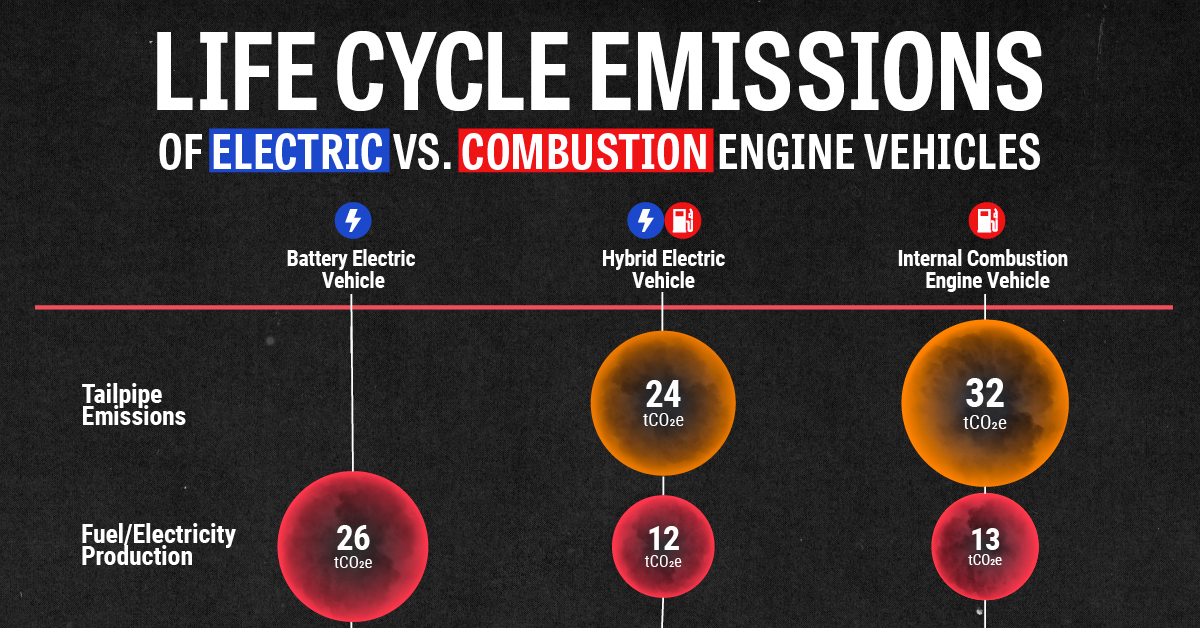We look at carbon emissions of electric, hybrid, and combustion engine vehicles through an analysis of their life cycle emissions.
A missing, but important, element in this discussion is vehicle disposal/recycling capability and environmental impact. The current state of battery recycling adds another layer of complexity to this equation.
https://www.autoblog.com/article/electric-car-battery-recycling-reuse-storage/
@SmolderingSauna That’s a false argument that the fossil fuel lobby loves to bring up. The reason there isn’t widespread recycling of EV batteries is because 99% of all the EV batteries that have been made are still in operation. The batteries typically outlive the cars, and are put to secondary uses for stationary applications.
https://blog.ucsusa.org/hanjiro-ambrose/the-second-life-of-used-ev-batteries/
https://www.canarymedia.com/articles/energy-storage/used-ev-batteries-are-storing-solar-power-at-grid-scale-and-making-money-at-itIf you want to ring your hands about battery waste, the US throws out about 54 megawatt-hours worth of lithium battery storage each month in the form of single-use electronic vapes.
I’m coming from a vehicle OEM. Down cycling isn’t recycling: we can’t decompose EV batteries and reuse/recycle like we can, say, steel.
@SmolderingSauna Sorry, I’m coming from a PhD in chemistry, and that’s BS. There is more than one process to recycle the the metals in batteries, and they’re all >98% recovery. Atoms are atoms. They’re not alchemically trasmuted into other elements.
The reason that they’re being used is because they’re still good. When they’re no longer good, they can be recycled. It’s just going to take another decade before we have a substantial need for recycling them. That’s not a bad thing.
It’s not great is it? Reasonably we just need less vehicles
It’s still a net improvement, even with the incorrect assumption that everyone’s electricity is equally filthy. Can we as a species please stop letting the perfect be the enemy of the good for like five minutes?
I never said we need to be perfect, you’re dismissing the argument to save your feelings.
I said we need to drive less. It’s not hard, it’s not perfect, and it’s the centre of most European planning efforts to mitigate climate change.
Electric cars are and industry solution to an industry problem, they’re not a reasonable response to climate change
It is in fact very, very hard, when your entire country is planned around the automobile. You’re talking about building infrastructure that doesn’t exist, and replanning every single town.
When I lived in Chicago, I drove once a week, for groceries, because I lived in a food desert. Otherwise I rode my bicycle (yes, in the winter too). That’s not even remotely practical now, because I live in a very rural area.
Again: don’t let perfect be the enemy of better.
Yes, build the damn infrastructure, now. It’s not about perfect it’s about working toward a minimum viable output and electric cars miss that mark.
I don’t think you have any idea how difficult that is, particularly since the US isn’t a totalitarian dictatorship. There are a lot of factors in play for the average person, and you need to convince that person that they should change everything about their life and pay far more in taxes, for something that a significant percentage don’t believe in or care about. You can’t win with a fact-based argument; you need to successfully appeal to emotion. And so far, climate activists are doing a really, really bad job at that. Getting people to make incremental change is more likely to be effective, even if make reform is needed.
There’s also a prisoner’s dilemma here; if we bankrupt the country building this infrastructure, and China and India don’t, then not only is climate change not significantly affected, but we also lose economically.
Are we seeing the same chart? 2/3rds of the carbon emission from the EV comes from the ridiculous way that many communities are still generating electricity. But that’s totally fixable!! We are generating more and more electricity thru renewables every day, and eventually nobody will have the audacity to claim that wind turbines are bad for the environment. Or at least no one will believe them.
Yes, we’re seeing the same chart. Now add a bicycle, or replace 60 stupid little Tesla’s with a bus.
We are not at a point where electric car ownership is a viable solution, we’re at least 20 years too late. Even the manufacturing cost us too great.
The problem is that you can’t simply add bicycles and buses in most places. We fucked up big time when we embraced the car and started living the spread out life. Our cities and rural communities worried literally have to be completely redesigned for that. When I lived in Miami (where I’m from), I rode a bike everywhere. Even though it’s very spread out, it’s flat and relatively easy to ride around in. Even the rain isn’t an issue because while it rains almost every day in the rainy season, you mostly know when it’s going to happen. My university was 8 miles from home and that wasn’t too bad of a ride. And if something was really far I could ride my bike to whatever bus was going a long way. I couldn’t see a lot of people living like that, but it was certainly possible.
But now I live in a rural community in New England. I simply can’t ride my bike to school (where I work) everyday. And a bus doesn’t make sense because we’re all coming from different, spread out places and going to different, spread out places.
Changing how we generate electricity is orders of magnitude easier than trying to convince 400 million people to change how and where they live. It’s as simple as that.
It’s not enough. Cutting transport emissions by two thirds is simply not enough. We can change planning now to make it hurt slightly less when we have to get rid of cars or we can continue the current path and leave a load of people stranded when the rug gets pulled, which do you think sounds better?
So it’s what then? Genocide? A new trail of tears where people are forced to leave their rural homes and move into massive cities that don’t currently exist?
Yes, those are the two sole options, cars and genocide. Fucking idiot. Have you heard of a bus?
3.4 billion people live in rural areas around the world. Areas where public transportation is not viable. I’m asking what you would do with them once you take away their only travel option.
But wind turbines are responsible for entire flocks of migrating birds getting ground up like chuck.
Edit to throw a source in https://www.sierraclub.org/michigan/wind-turbines-and-birds-and-bats
I’m assuming a silent /s here. I certainly hope so.
Why does pointing out a documented issue with wind turbines need to be sarcastic?
Because it’s rare to see someone include a link to support their argument, that actually demolishes their argument. Unless that person is being ironic/sarcastic.
To be clear. The articles does not say that wind turbines destroy “entire flocks of birds”. It points out that in the grand scheme of things, wind-turbines are a net positive for bird populations, and goes on to say that while numbers of bird deaths aren’t negligable - work is going on to reduce numbers further.






